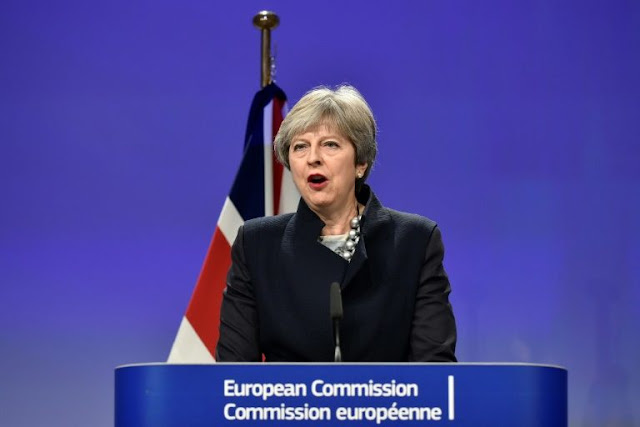British Prime Minister Theresa May scrambled Tuesday to salvage a deal over the post-Brexit border in Ireland after it was rejected by her DUP allies, exposing the weakness of her position in EU negotiations.
 |
| AFP / JOHN THYS |
British Prime Minister Theresa May scrambled Tuesday to salvage a deal over the post-Brexit border in Ireland after it was rejected by her DUP allies, exposing the weakness of her position in EU negotiations.
May was expected to hold talks with Northern Ireland's small Democratic Unionist Party (DUP), which keeps her Conservative minority government in office, after it blocked agreement on a major issue holding up Brexit talks.
Sources said Britain had agreed to keep EU trade rules for British-controlled Northern Ireland, even if the country as a whole withdrew from the European single market and customs union.
This followed a demand from Dublin for guarantees that Brexit would not lead to the return of frontier checks, amid fears of inflaming sectarian tensions in a region plagued by violence in the 1970s, 1980s and 1990s.
But as May sought to close the deal over lunch with European Commission chief Jean-Claude Juncker in Brussels on Monday, the DUP made clear that any special deal for Northern Ireland was unacceptable.
"As I understand it, the DUP were spoken to about the proposal but the precise wording it seems was not made clear," former British Brexit minister David Jones told BBC radio on Tuesday morning.
"Clearly the prime minister has got a lot of talking to do with (DUP leader) Arlene Foster today."
Ireland said it would not change the text agreed with the EU and London, but European affairs minister Helen McEntee told the state broadcaster RTE that "further clarification was needed".
May met her cabinet on Tuesday morning, and British Finance Minister Philip Hammond said the government was still "very confident" of reaching a deal.
He said that May would return to Brussels later this week for fresh talks.
The frenzied diplomacy caused the pound, which had rallied on Monday on hopes of a deal, to fall on the currency markets against the euro and the dollar.
- Special deal for 'entire UK' -
May's domestic critics seized on her failure to secure a deal on Ireland, one of three issues on which she must make progress if EU leaders are to agree to open trade talks with Britain at a summit next week.
"Each passing day provides further evidence that Theresa May's government is completely ill-equipped to negotiate a successful deal for our country," said main opposition Labour leader Jeremy Corbyn.
A deal on Britain's financial settlement is largely agreed, although differences remain on the role of the European Court of Justice in securing the rights of EU citizens in Britain after Brexit, UK officials say.
However, failure to reach a deal on Ireland could hold up the entire process -- and if trade talks cannot start later this month, it makes it much harder for Britain to secure a trade deal before it leaves the EU in March 2019.
May cannot just ignore the DUP. She needs their 10 MPs to pass legislation through the House of Commons, after her Conservatives lost their majority in a June snap election.
"The fact that they managed to stall the negotiations yesterday I think demonstrates the precise strength of their position," Jones said.
Some Conservative MPs are also threatening trouble over a proposal that would effectively move the trade border from Ireland into the Irish Sea, jeopardising the territorial integrity of Britain.
"The government doesn't have a majority for that," leading Brexit supporter Jacob Rees-Mogg said.
One unnamed senior MP told The Times that if May went too far, "then we and the DUP will withdraw support and there could be a leadership change this side of Christmas".
Scottish Conservative leader Ruth Davidson also weighed in on Tuesday, warning that while nobody wanted a hard border in Ireland, "jeopardising the UK's own internal market is in no-one's interest".
The leaders of Scotland, Wales and London have said they would seek special status for their own regions if it were granted to Northern Ireland.
Davidson, who opposed Brexit, went further, saying: "If regulatory alignment in a number of specific areas is the requirement for a frictionless border, then the prime minister should conclude this must be on a UK-wide basis."

Post A Comment:
0 comments so far,add yours